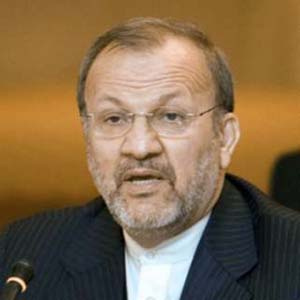Mottaki’s Reading of ElBaradei’s Report
While ElBaradei’s report has been criticized by Ali Larijani, Mottaki says there’s no specific negative point about it

While European countries’ reaction to ElBaradei’s latest report on Iran’s nuclear program has been upsetting and some Iranian officials have rejected the report because of its reference to Iran’s refusal to provide IAEA with requested information, the Iranian Foreign Minister Manouchehr Mottaki says that he has seen no specific negative point with the report.
After ElBaradei’s report was released, the Iranian media called it further evidence on the peaceful nature and non-deviation of Iran’s nuclear program. Ali Asghar Soltanieh, Iran’s permanent envoy to IAEA, said the report signals finalization of Iran’s case by IAEA. However, if we put together Iran insistence to continue uranium enrichment and its belief that it has answered all IAEA questions and has allowed for IAEA’s frequent inspection of its nuclear sites with reference to slow response to requested information, continuing uranium enrichment, alleged studies remaining a moot point and lack of open access to some sensitive projects, the consequent result will be rejection of IAEA’s latest report by Iran. Definitely Iran expected mentioning its cooperation with the nuclear watchdog.
The important point in the report has been mentioning alleged studies that have been called a serious cause of concern. IAEA Director General believes clarifying this case is important for assessment of Iran’s past and present nuclear program. It is clear that ElBaradei’s equivocal sentences make no final judgment on Iran’s nuclear activities and suspend decision until all ambiguities on alleged studies, remaining questions and acceptance or rejection of 5+1 incentives are solved out.
However, on Wednesday 28th of May after the cabinet’s meeting, Manouchehr Mottaki told the reporters that: "in general, ElBaradei’s last report confirms the previous report on non-deviation of Iran’s nuclear activities. As a committed member of IAEA, Iran continues its cooperation with the organization. Talks and inspections are following the natural course and we see no specific negative point in ElBaradei’s report."
Prior to Mottaki’s remarks, Ali Larijani, the new spokesman of the Iranian parliament and former secretary of Supreme National Security Council warned that the parliament would set a new line for cooperation with IAEA if deceptions continue.
Addressing IAEA, he requested the organization to stop diplomatic plays with 5+1. Larijani’s remarks show that Iranians are aware of the connection between IAEA, international community’s future decisions and Iran’s behavior towards the six group’s proposed package of incentives.
European’s Reaction
France, European member of the 5+1 group, expressed its concerns over Iran’s nuclear program after ElBaradei’s report was released. Spokeswoman of France Ministry of Foreign Affairs, Pascale Andreani, said that the report confirms concerns over Iran’s likely attempts to build nuclear weapons. AFP quoted Andreani: "we note that based on information judged ’precise and generally coherent’ the report describes in detail activities which could be the sign of a possible military dimension of the Iranian nuclear program."
Germany has also reacted to IAEA’s report, calling for more pressure on Iran by the international community. Frank-Walter Steinmeier said IAEA’s report showed that members of the international community should put Tehran under more time pressure to clarify over its nuclear program faster and clearer.
Speaking at the opening session of NATO’s parliamentary assembly meeting Tuesday in Berlin, he added Iran has yet left many questions unanswered. Steinmeier added: "we have to see if Iran will give rational answers to international community’s questions and whether it will pave the way for start of negotiations to find diplomatic solutions." Meanwhile, Gregory Schulte, United States’ envoy to IAEA said Iran had made scant progress in clearing up the outstanding issues.
Looking at Iran’s reaction and Europeans’ increasing concerns, it seems that ElBaradei’s report shows no significant opening in Iran’s nuclear case and its main function will be sustention of international consensus, increase of political pressures and toughening economic sanctions against Tehran. Some political observers believe that the ambiguity in ElBaradei’s report and the allegations mentioned are to force Iran to accept the new package of incentives which are going to be handed to Tehran by Javier Solana.
In such circumstances, Manouchehr Mottaki states that he doesn’t see any specific negative point in the report. Mottaki believes that the report confirms the previous report on non-deviation of Iran’s nuclear activities and Iran continues its cooperation with IAEA as a committed member.

